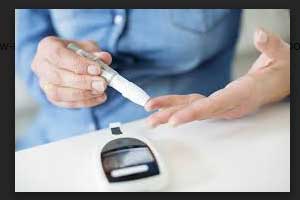- Home
- Editorial
- News
- Practice Guidelines
- Anesthesiology Guidelines
- Cancer Guidelines
- Cardiac Sciences Guidelines
- Critical Care Guidelines
- Dentistry Guidelines
- Dermatology Guidelines
- Diabetes and Endo Guidelines
- Diagnostics Guidelines
- ENT Guidelines
- Featured Practice Guidelines
- Gastroenterology Guidelines
- Geriatrics Guidelines
- Medicine Guidelines
- Nephrology Guidelines
- Neurosciences Guidelines
- Obs and Gynae Guidelines
- Ophthalmology Guidelines
- Orthopaedics Guidelines
- Paediatrics Guidelines
- Psychiatry Guidelines
- Pulmonology Guidelines
- Radiology Guidelines
- Surgery Guidelines
- Urology Guidelines
Continuous Glucose Monitoring may shed light on hypoglycemia in non-diabetic people

Clinically hypoglycemic blood sugar values that correlate with reported hypoglycemic symptoms in people without diabetes can be detected with the use of modern continuous glucose monitoring (CGM) technology, suggests a recent study.
Hypoglycemia or a sudden, serious episode of low blood sugar as a condition unto itself in non-diabetic people has been a controversial phenomenon for long. The study, published in the Journal of Clinical & Translational Endocrinology, is believed to be the first to address this controversial phenomenon.
Clinical visits of non-diabetic patients reporting hypoglycemic symptoms are common in endocrinology practices but still remain understudied. It also lacks a clinical definition and evidence-based recommendations for diagnosis or treatment. The goal of this study by Morgana Mongraw-Chaffin, Wake Forest School of Medicine, Winston-Salem, NC, US, and colleagues was to pilot test the concordance of hypoglycemic symptoms with low glucose values in young non-diabetic individuals.
Hypoglycemia in the absence of diabetes is a regular complaint by the young non-diabetic patients referred for endo evaluation. The condition, also referred to as reactive, postprandial, or idiopathic hypoglycemia, despite being prevalent, has no standard diagnostic criteria. Also, there are few estimates of its prevalence in the general population and a little evidence of its potential health implications.
The study evaluated eight young women (average age 29 years; 25% were African American and 25% had obesity) who reported symptoms of shakiness, dizziness, headache, and irritability that was attributable to low blood glucose. The participants were made to wear a blinded Dexcom continuous glucose monitor and reported symptoms for seven days. The study, however, had no control group, so it's far from being conclusive.
Individuals with diabetes or other known causes of hypoglycemia or similar symptoms were excluded.
Also Read: New Indian Guideline on continuous glucose monitoring
Key findings include:
- All participants experienced glucose values ≤ 70 mg/dL and a half (4/8) experienced glucose ≤ 54 mg/dL for at least 15 min or 3 consecutive readings.
- The average time between the last meal and reported symptoms was 4.4 h.
- Lower glucose values were significantly associated with higher odds of experiencing hypoglycemic symptoms 1.15 for every −5mg/dL, from mixed-effects models for repeated measures adjusted for age, race, and body mass index.
- All participants also reported engaging in potentially obesogenic behaviours in order to avoid symptoms.
"The current state of CGM technology combined with our approach of classifying hypoglycemia by repeated measurements below the minimum value, and the concurrence of these readings with reported symptoms, provide strong support for our findings of clinical hypoglycemia in these young women without diabetes," write the authors.
"Our results support the longstanding clinical observations of endocrinologists who regularly see young non-diabetic patients complaining of hypoglycemic symptoms, and contradict the belief that self-reported hypoglycemic symptoms are unreliable indicators of glucose level," they added. "New technology has allowed for the feasibility of concurrent measurement and reduced participant burden, and offers an opportunity for future investigation to fill the large gaps remaining in this area."
"We hope these findings will be a first step towards answering patient questions about this potentially highly prevalent condition and understanding the control and implications of glucose regulation more generally," they concluded.
The bottom line of the study is --> Hypoglycemic symptoms in the absence of diabetes are an indicator of potential clinically significant hypoglycemia that warrants further investigation and understanding.

Disclaimer: This site is primarily intended for healthcare professionals. Any content/information on this website does not replace the advice of medical and/or health professionals and should not be construed as medical/diagnostic advice/endorsement or prescription. Use of this site is subject to our terms of use, privacy policy, advertisement policy. © 2020 Minerva Medical Treatment Pvt Ltd